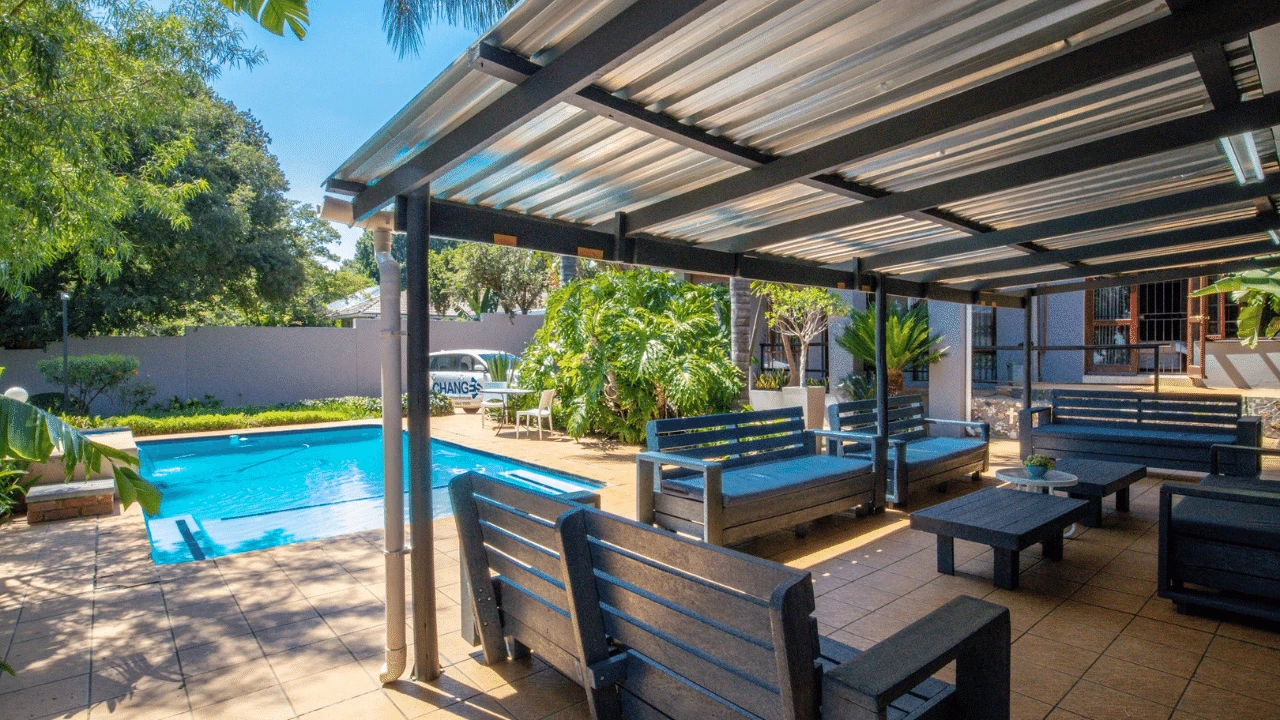
Addiction Treatment Phases Across Gauteng Facilities
Which phase of addiction treatment across Gauteng facilities best matches your current clinical needs and personal recovery goals?
People imagine rehab as a phase you enter and then “complete,” but addiction doesn’t heal in phases, people do. That’s why Changes doesn’t run a one-size-fits-all programme; we run a continuum of care that adapts to who the patient is, what they need, and where they are in their capacity to change. Treatment isn’t a straight line from detox to discharge. It’s a progression of stabilisation, insight, skill-building, accountability, and gradual reintegration into real life. Each phase exists because addiction unravels a life in layers, and those layers can only be rebuilt with structure that matches the stage the patient is in.
Our continuum spans detox, primary care, secondary care, tertiary living, outpatient treatment, aftercare and long-term psycho-educational support. Across four Gauteng facilities licensed for residential detox and inpatient treatment with 24-hour nursing, our multidisciplinary team of psychologists, psychiatrists, counsellors, social workers, occupational therapists, medical staff, coaches, halfway house managers and recovery assistants work together to ensure patients get what they need when they need it, not simply what the brochure says happens next.
The point of the continuum isn’t to keep people in treatment. It’s to make sure treatment meets the person, not the other way around.
Why a Continuum of Care Exists
Addiction breaks things at different depths: physical dependence, emotional instability, thinking distortions, relationship patterns, and the person’s ability to function in daily life. Those layers cannot be repaired at the same pace. Detox can stabilise the body in days. Primary care can stabilise thinking in weeks. Secondary care deepens behavioural change across months. Tertiary care helps people relearn how to live without treatment holding them up. Outpatient programmes stabilise people who don’t require full immersion, and aftercare maintains momentum once the intensity lifts.
Without a continuum, patients either move too quickly and relapse because the foundation is weak, or stay too long in one phase without developing the independence needed for real-life sobriety. A phased treatment system ensures each person builds emotional strength, behavioural consistency, and psychological insight gradually, with the right support at each step. That makes sobriety sustainable not because the person becomes dependent on treatment, but because treatment gradually transfers responsibility back to them.
Restoring Physical Stability So the Real Work Can Begin
Detox happens first because nothing else matters until the body stops reacting to withdrawal. This phase restores sleep, eating patterns, hydration, and medical stability so the patient is capable of engaging in therapy without being overwhelmed by physical distress. Detox is short, usually three to seven days, longer for complex substances, but essential. It is the baseline from which the clinical team can assess what the patient actually needs. Rehab doesn’t begin until the body stops fighting for chemical survival. Detox is the doorway, not the destination.
Primary care is where patients finally see the truth of their addiction. The brain clears, denial cracks, and the clinical team narrows the gap between the patient’s perception of their addiction and the reality that brought them into treatment. This phase is intensive: therapy, routine, exposure to honest feedback, accountability, and deep emotional work. Patients examine their behaviour, relationships, thinking patterns, trauma, and the emotional survival strategies that shaped their addiction. It is the first time many people understand why they couldn’t stop using, even when everything was falling apart.
Primary care lasts 21–42 days, depending on clinical need and medical aid authorisations. But sobriety after 21 days isn’t stability. It’s vulnerability. Primary care prepares the person for change, it doesn’t complete the change.
Turning Insight Into Behaviour
If primary care reveals the truth, secondary care teaches the person how to live differently. This phase exists because early sobriety is emotionally unpredictable and full of triggers that don’t appear inside a rehab environment. In secondary care, patients gain more independence while still receiving structured therapeutic support. They practice emotional regulation, build routines, confront stressors, work on relationships, and apply skills they learned in primary care to real-world pressures in a controlled environment.
This phase is crucial because relapse rates drop significantly once patients pass the ninety-day mark. The brain stabilises further, denial decreases, and sustained behavioural change becomes possible. Secondary care is where sobriety begins to feel real rather than fragile.
Learning to Live Without Treatment Holding You Up
Tertiary care bridges the gap between treatment and everyday life. Patients live in sober homes with structure, accountability, peer support and therapeutic oversight while working, studying, repairing relationships or rebuilding independence. This phase addresses the part of recovery that treatment alone cannot fix, how to function in real life without collapsing.
In tertiary living, the patient’s world expands again, slowly and safely. They make mistakes, correct them, seek support, learn responsibility and rediscover autonomy. This isn’t “extended rehab.” It’s sober life with scaffolding. People who skip this phase often return to environments that emotionally outpace their readiness, which is why halfway care dramatically improves long-term outcomes.
Treatment for People With Mild to Moderate Addiction
Not everyone needs full-time residential treatment. Some people, especially those with strong support systems, can stabilise in an outpatient model. Outpatient treatment at Changes allows patients to live at home, work full-time, and attend evening therapy and structured clinical groups. This phase still includes accountability, relapse-prevention work, counselling, and group therapy, but without the intensity of residential care.
Outpatient treatment is not a “lighter” option; it is the right option for the right patient. Its purpose is to prevent deterioration and intervene early before an addiction escalates to the point where residential care becomes necessary.
Sustained Recovery, Not Sudden Independence
Leaving treatment is not the end of the process. It’s the part where people most often relapse if they’re not connected to ongoing support. Aftercare offers structured therapy, group sessions, family guidance, and relapse-prevention work for people with six to nine months of sobriety. Life Orientation groups extend this support to a year of structured maintenance, because emotional stability, behavioural consistency and support networks take time to solidify.
The reason this works is simple: addiction changed the brain long before the person entered treatment, and it takes sustained work, usually close to a year, for new neural pathways, routines and coping strategies to become automatic. Aftercare gives people the runway they need to move from sobriety as effort to sobriety as a lifestyle.

Inpatient Detox
Primary Care Rehab in Johannesburg
Changes’ primary facility accommodates 16 patients in Northcliff, Johannesburg. This intensive phase focuses on safe detox and withdrawal, dismantling denial, and building early recovery skills. Daily therapeutic modalities, 24-hour supervision with an experienced nurse, and nutritious, dietary-aware meals ensure a safe, comfortable start to treatment.

Long Term Rehab
Secondary Care Rehab
River Manor or ‘The Farm’ is a tranquil 20-bed facility in Ruimsig designed for deeper, longer-term treatment. Clients engage in a structured therapeutic routine, animal-assisted work (including equine), and guided personal growth, with 24-hour supervision and nurse support to manage needs as they arise.

Sober Living Homes
Tertiary Care Rehab
Changes facilitates two halfway house locations based in Johannesburg. Johannes House in Fairland and Auckland House in Melville are designed to support staged reintegration. Clients face real-world challenges with professional guidance, continue group therapy three times weekly, meet individually with counsellors, and are supported by experienced managers 24/7.
Addiction is a chronic illness, not a bad habit or a moral failure. It rewires behaviour, relationships, thinking, identity and emotional patterns. The continuum of care at Changes exists to rebuild those layers gradually and sustainably. Each phase hands the patient more responsibility, more insight, and more independence, but never more than they can handle.
The goal isn’t to keep people in treatment. It’s to make sure they have enough foundation, stability, and emotional capacity to build a life they don’t need to escape from. Because the real measure of recovery isn’t how long someone stays in rehab. It’s how well they live once they leave.
Assessment
A private clinical assessment clarifies risks, co-occurring concerns, and immediate next steps. We gather history, current symptoms, medications, and family input to match the right level of care. If admission is appropriate, we help you plan timelines and documentation so things move quickly. Learn how assessments work and what to expect on the day.
Withdrawal is managed under medical oversight to reduce risks and improve comfort. Nursing support is available 24/7, with medication protocols tailored to clinical need. Detox prepares patients for therapeutic work—sleep, nutrition, and stabilisation come first. See what to bring, typical timelines, and how we coordinate pre-authorisation.
The first 21–42 days focus on routine, safety, and daily therapy. Patients engage in individual and group sessions, psycho-education, and family contact where appropriate, supported by a multidisciplinary team. Primary care builds early momentum for change and prepares the plan for the next stage.
Secondary care deepens the work on patterns, triggers, and trauma in a calmer setting. With structured days, therapeutic groups, and coached routines, patients practise skills that hold at home. Families are updated and involved appropriately. Explore typical lengths of stay and why secondary care improves long-term outcomes.
For step-down care or when residential treatment isn’t possible, outpatient combines evening groups, one-to-one therapy, and accountability. The focus is integrating recovery into daily life—work, study, and family responsibilities—while maintaining structure and support.
Sober living provides a structured, supportive home environment with curfews, chores, coached routines, and ongoing therapy. It bridges the gap between inpatient treatment and independent living, reinforcing accountability and community while returning to work or study.
Patients learn how to spot risk early and respond fast—managing triggers, cravings, and high-risk situations. We build practical routines, communication plans, and support networks, with clear steps families can take too. See typical tools and how they’re practised before discharge.
Continuing care sustains progress after discharge: scheduled check-ins, group support, individual sessions where needed, and a plan for setbacks. We coordinate with families and community resources to keep recovery anchored in daily life.

Addiction and mental health treatment that connects the dots.
Changes Rehab Johannesburg has been in continuous operation since 2007, with a multidisciplinary team that treats substance use and co-occurring mental health issues under one roof.






